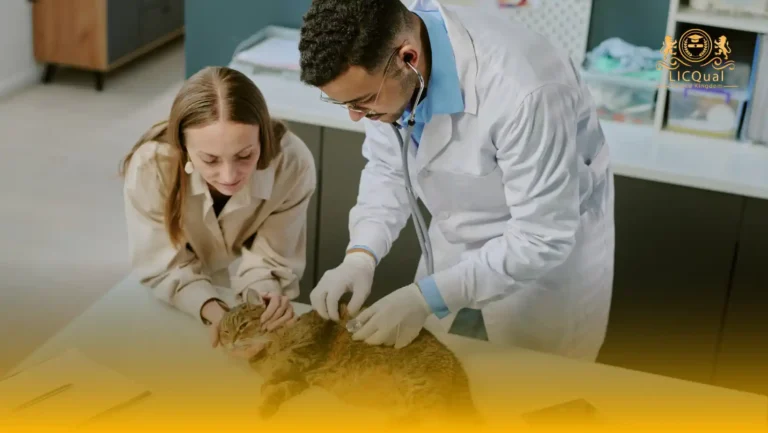The LICQual Level 3 Certificate in Nutritional Assessment and Dietary Analysis (Cert Dietary Analysis) is a specialised qualification designed for professionals seeking to deepen their understanding of nutrition, dietary assessment, and evidence-based dietary planning. This advanced programme equips learners with the skills to accurately evaluate dietary intake, analyse nutritional data, and develop personalised dietary recommendations to improve health and wellbeing.
This qualification is ideal for healthcare practitioners, nutritionists, dietitians, wellness consultants, and allied professionals who wish to enhance their career prospects, expand their knowledge, and maintain a commitment to Continuing Professional Development (CPD). Learners gain practical skills in assessing nutrient intake, interpreting dietary patterns, and applying nutritional science in clinical, community, or wellness settings.
Centres delivering the LICQual Level 3 Certificate in Nutritional Assessment and Dietary Analysis are required to maintain the highest standards of training. Learners benefit from competent and qualified staff, alongside access to all necessary resources and learning materials, ensuring a comprehensive understanding of course content and successful application in professional practice. The programme combines theoretical knowledge with practical assessment techniques, allowing learners to confidently implement evidence-based dietary strategies.
By completing this course, learners will develop a strong foundation in nutritional assessment, dietary analysis, and professional practice, enabling them to make informed decisions that positively impact individual and community health. This qualification represents a significant step forward for professionals seeking to integrate scientific knowledge with practical skills in nutrition, dietary planning, and health management.
Course Overview
Qualification Title
LICQual Level 3 Certificate in Nutritional Assessment and Dietary Analysis (Cert Dietary Analysis)
Total Units
6
Total Credits
24
GLH
120
Qualification #
LICQ2201021
Qualification Specification
To enroll in the LICQual Level 3 Certificate in Nutritional Assessment and Dietary Analysis (Cert Dietary Analysis) , applicants must meet the following criteria:
|
Qualification# |
Unit Title |
Credits |
GLH |
|---|---|---|---|
|
LICQ2201021-1 |
Principles of Nutritional Assessment |
4 |
20 |
|
LICQ2201021-2 |
Dietary Analysis Methods |
4 |
20 |
|
LICQ2201021-3 |
Nutrient Requirements and Guidelines |
4 |
20 |
|
LICQ2201021-4 |
Clinical and Public Health Nutrition |
4 |
20 |
|
LICQ2201021-5 |
Research Methods and Evidence-Based Practice |
4 |
20 |
|
LICQ2201021-6 |
Professional Practice, Ethics, and CPD |
4 |
20 |
By the end of this course, learners will be able to:
Unit 1: Principles of Nutritional Assessment
By the end of this unit, learners will be able to:
- Explain the key principles of nutritional assessment and its role in health and wellbeing
- Conduct anthropometric measurements and interpret results accurately
- Analyse biochemical markers relevant to nutritional status
- Evaluate overall nutritional status using a combination of assessment techniques
Unit 2: Dietary Analysis Methods
By the end of this unit, learners will be able to:
- Apply various dietary assessment methods, including food diaries and 24-hour recall
- Use dietary analysis tools and software to calculate nutrient intake
- Interpret dietary data to identify patterns, deficiencies, or excesses
- Develop practical skills in accurately recording and reporting dietary information
Unit 3: Nutrient Requirements and Guidelines
By the end of this unit, learners will be able to:
- Explain nutrient reference values and dietary guidelines for different populations
- Analyse dietary intake against established nutritional recommendations
- Assess individual and group nutrient requirements based on age, health status, and lifestyle
- Apply knowledge of nutrient needs to inform dietary planning and interventions
Unit 4: Clinical and Public Health Nutrition
By the end of this unit, learners will be able to:
- Conduct dietary assessments in clinical and community settings
- Identify nutritional deficiencies, risks, and dietary-related health conditions
- Develop evidence-based dietary intervention strategies
- Evaluate the effectiveness of dietary recommendations and interventions
Unit 5: Research Methods and Evidence-Based Practice
By the end of this unit, learners will be able to:
- Demonstrate understanding of research methodologies relevant to nutrition and dietary analysis
- Critically appraise scientific literature and research findings
- Apply evidence-based practices in dietary assessment and nutrition planning
- Design and present research-informed dietary recommendations
Unit 6: Professional Practice, Ethics, and CPD
By the end of this unit, learners will be able to:
- Demonstrate professional and ethical conduct in nutritional assessment and dietary analysis
- Apply relevant legal and regulatory frameworks in professional practice
- Identify opportunities for Continuing Professional Development (CPD) to enhance competence
- Reflect on professional practice to improve service delivery and client outcomes
The LICQual Level 3 Certificate in Nutritional Assessment and Dietary Analysis is designed for healthcare professionals, students, and individuals who want to specialize in evaluating diets and nutritional needs. This internationally recognized qualification is ideal for those seeking career growth, accreditation, and practical skills in dietary analysis. Whether you are a doctor, nurse, dietitian, or aspiring nutritionist, this accredited nutritional assessment and dietary analysis diploma provides the knowledge and certification needed to make a real impact in healthcare, wellness, and public health programs.
1. Healthcare Professionals
- Doctors aiming to integrate dietary analysis into patient care and treatment plans
- Nurses working in hospitals, clinics, or community health programs
- Dietitians specializing in nutritional assessment and evidence‑based practice
- Midwives supporting maternal and child nutrition through dietary evaluation
- Public health workers improving outcomes with nutrition assessment strategies
2. Medical and Health Students
- Undergraduate medical students preparing for advanced qualifications in nutrition and health sciences
- Nursing students seeking practical training in dietary analysis and nutritional assessment
- Public health students focusing on nutrition and disease prevention
- Nutrition science students wanting international accreditation in dietary analysis
- Learners strengthening their CV with a recognized certificate
3. Public Health and Community Workers
- NGO professionals delivering nutrition awareness and dietary assessment programs
- Community health workers supporting families with nutrition education and analysis
- Policy makers designing nutrition‑based healthcare strategies for populations
- Social workers involved in family and child welfare projects
- Educators promoting evidence‑based nutrition in schools and communities
4. Aspiring Nutritionists and Dietitians
- Individuals planning a career in nutrition and dietetics
- Learners seeking specialized knowledge in dietary analysis and assessment
- Professionals wanting to enhance credibility with Level 3 certification
- Those aiming to work in hospitals, clinics, or wellness centers
- Students preparing for advanced diplomas in nutrition and healthcare
5. International Learners
- Healthcare professionals in Pakistan, Middle East, and UK
- Students seeking globally recognized dietary analysis diploma
- Learners aiming for international career opportunities in healthcare and academia
- Professionals needing accredited online training for career progression
- Individuals looking for flexible, affordable online learning options
6. Career Changers
- Professionals from other fields transitioning into healthcare and nutrition
- Individuals passionate about nutrition, dietary analysis, and wellness
- Career seekers wanting to enter public health or clinical nutrition sectors
- Those looking for accredited qualifications to boost employability
- Learners motivated by global recognition and career growth
7. Continuing Professional Development (CPD) Seekers
- Healthcare workers needing CPD credits in dietary analysis and nutritional assessment
- Professionals updating skills with evidence‑based knowledge
- Learners seeking structured online training for career advancement
- Individuals wanting internationally accredited CPD certification
- Practitioners committed to lifelong learning in healthcare and nutrition
To deliver the LICQual Level 3 Certificate in Nutritional Assessment and Dietary Analysis effectively and ensure high-quality learner outcomes, centres must meet the following requirements:
- Qualified and Competent Staff: Centres must have experienced tutors with appropriate qualifications in nutrition, dietetics, healthcare, or related fields. Staff should be capable of delivering both theoretical knowledge and practical skills.
- Access to Learning Resources: Centres must provide learners with comprehensive learning materials, including textbooks, scientific journals, digital resources, dietary analysis software, and any additional tools required to support learning and assessment.
- Appropriate Learning Environment: Centres should maintain well-equipped, safe, and professional facilities suitable for teaching, practical sessions, and assessment activities.
- Assessment and Quality Assurance: Centres must implement robust assessment procedures and internal quality assurance processes to ensure fair, consistent, and accurate evaluation of learner performance.
- Support for Learners: Centres should provide guidance, mentoring, and support throughout the programme, including access to academic support, study resources, and additional learning aids as required.
- Compliance with Health and Safety Standards: Centres must adhere to all relevant health, safety, and regulatory standards to ensure the wellbeing of learners and staff during training activities.
- Commitment to Continuous Improvement: Centres should regularly review and update course delivery methods, learning materials, and assessment strategies to maintain alignment with best practices and industry standards.
Meeting these requirements ensures learners receive high-quality training, gain practical skills, and successfully achieve their LICQual Level 3 Certificate in Nutritional Assessment and Dietary Analysis qualification.
Assessment and Verification
All units within this qualification are subject to internal assessment by the approved centre and external verification by LICQual. The qualification follows a criterion-referenced assessment approach, ensuring that learners meet all specified learning outcomes.
To achieve a ‘Pass’ in any unit, learners must provide valid, sufficient, and authentic evidence demonstrating their attainment of all learning outcomes and compliance with the prescribed assessment criteria. The Assessor is responsible for evaluating the evidence and determining whether the learner has successfully met the required standards.
Assessors must maintain a clear and comprehensive audit trail, documenting the basis for their assessment decisions to ensure transparency, consistency, and compliance with quality assurance requirements.







